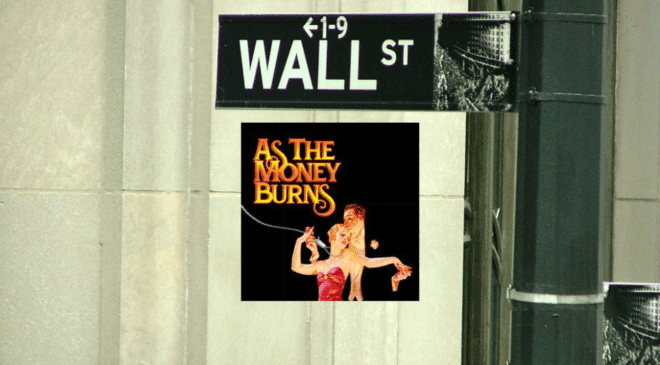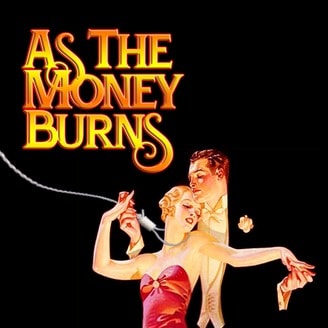Podcast Spotlight: As The Money Burns

If you have always been drawn to wealth and luxury, this is the podcast series for you! As the Money Burns deep dives into the lives of actual heirs and heiresses to some of America’s most famous fortunes when the Great Depression hit. Host Nicki Woodard is not here to decide if insane wealth is morally good or bad, but rather examine what it has done to people. Before the Great Depression, journalists began using real names and photos of the ultra-wealthy instead of pseudonyms, meaning their lives were overexposed and well-documented. This podcast is addicting, and the stories are dramatic, upsetting, and well-researched. Woodard covers Ponzi schemes, King Tut discoveries, the Vanderbilt dynasty, and more.

Woodard started this podcast during the coronavirus pandemic, when it is hard not to dream about wealth giving you access to freedom, choice, and health care. Having more money can solve survival problems by providing food and shelter, but listeners will see it does not guarantee happiness or safety. This podcast was made for the escapist and dreamer.
We were fortunate to talk with Woodard about the podcast, how they differentiate from other podcasts, and their future plans in podcasting. See below for our full Q&A.
Listen: Apple Podcasts | Stitcher | Spotify | Podchaser
DISCOVER PODS: How’d you get into podcasting?
WOODARD: Podcasting came to me like an epiphany during a pivotal moment early this year. I have spent years trying to find a way to merge my passions of media and history together and discover my own creative voice. I’ve worked entertainment jobs (History Channel, A&E, Mr. Robot, and other projects), and on my own I am always developing ideas based on history. For seven years I struggled to get a television series off the ground. The subject would initially attract top level interests, but I was continuously told my role would be greatly diminished because no one could understand my contribution within the Hollywood system.
Before lockdown, I had a longterm administrative temp gig where I started listening to podcasts to help me survive. Aaron Mahnke’s Lore, Dan Carlin’s Hardcore History, various interviews with Robert Greene, Malcom Gladwell, and Ryan Holiday,… I felt like finally someone was speaking the way my brain works – a collaboration of multiple historical threads weaved together. In February 2020, after hearing more about the origins of Aaron Mahnke’s Lore, it dawned on me I should turn my tv series into a podcast – that would give me the intellectual property protecting my story contribution. Luckily, I had enough of a technical background and skills to get me started. And that’s where it matters – getting started. The lack of approval barriers and complete control over content were big pluses. The only obstacle was myself, and well that’s obviously fixable.
DISCOVER PODS: In your own words, why should listeners tune in to As The Money Burns?
WOODARD: Unearthing secrets behind America’s royalty, As The Money Burns delves into the lives of actual heirs and heiresses to some of the most famous fortunes during the Great Depression. It is a twisted tale of the perils of having too much money, especially inherited money. The core story revolves around two young heiresses and their first loves and romances that go horribly wrong. At every turn, they battle greed, lust, envy, and self-doubt. The story begins during the last magical innocent summer before the infamous Wall Street Crash when everything seemed perfect and their futures shined brightly ahead.
The podcast works to dispel the myths and go deeper into the psychology behind their disastrous decisions. It is a wild ride because everyone is far more connected than we previously realized. I work to reconstruct the world back then to show those connections to each other as well as familiar events like the Titanic, the discovery of King Tut’s tomb, the Harlem Renaissance, and other elements that we can relate to in the modern day. I really like to play with my audience and drop hints along the way, such as there’s a Ponzi scheme that’s going to surface. I seed the story throughout the episodes, because everything has a purpose and ties together.
History always repeats itself, and our current day even pre-pandemic we are following similar cycles. I think now, more than ever, the audience can relate to the situations presented. The story is also very personal. This is a story built out of my broken heart and broken dreams. My own life has strange parallels which I admit and highlight to help explain how and why I discovered and developed the stories that I did. Subjects like death, suicide, divorce, and young love touch us all.
DISCOVER PODS: What kind of feedback have you heard from your listeners?
WOODARD: They are amazed at how much they love the story, get immersed into the world, and quickly find it addictive. The three part structure (in sections: story, history, contemporary) adds the flesh, bones, and heart to real people and situations from a not so distant past. I get asked if this or that is really true as they crave even more specifics. Some facts can really blow a person’s mind. They also find it satisfying to see how things are connected to the modern day from pop culture to surviving buildings to relatable personal situations. Sometimes the scarier part is when I reveal my own personal experiences, and that has come with some very emotional reactions from those closest to me.
On a more blushing note, people enjoy the melodic and wistfully hypnotic cadence of my voice. I also love when I hear couples are listening to it together, as part of the story is a reaction to today’s modern concept of romance and dating in the digital age. Right now, I have people in Bangkok, Paris, and Geneva listening. So it’s exciting how far this can reach. The episode lengths average around 20 minutes and fits great into busy schedules. It’s the one thing I’ve done; everyone can get a hold and listen in their own way.
DISCOVER PODS: Describe your recording set up? What equipment are you using?
WOODARD: Blue Yeti USB mic + C922 Pro Streamer Pack, though haven’t used HD camera yet
Sony headphones WH-CH700N
Adobe – Premiere, Rush, & Audition
HP envy laptop
It’s just me, the microphone (w/ pop filter), headphones, and computer. I first was recording my voice via Adobe Rush, but I am now switching over to Audition and really enjoying the sound quality. I record multiple takes then trim down. I edit and mix with headphones and Premiere, because my video background means I understand that software and set up more. Recently, I realized I need to upgrade the RAM on my computer. Always gotta level up in skills and technology.
DISCOVER PODS: What’s the biggest challenge you face as an indie podcaster?
WOODARD: Right now, it’s doing all of it, especially in areas where I am weakest – sound engineering and social media. After making historical documentaries in high school and going to film school, I worked various jobs working in Hollywood. I have always had technical skills, but my weakness was always audio. Now, I’m completely reliant on audio, and there is so much to learn. Every few episodes there’s a new issue to overcome.
As well, I have always been rather quiet on social media, so now I have to push myself and learn the different nuances to all the different mediums. I need to find and build my audience. I don’t think it’s immediately the format or subject people are looking for, but when they find it, they like it. I cover the Great Depression which eerily parallels our lives now more than ever.
One other issue, I always feel behind. I wish I had started podcasting sooner. I have so much story to tell, that I can’t write and produce as fast as I need to get the story where I want it to be. I have had over 7 years developing these particular stories and research – over 55+ books and 2100+ news articles with over 90% being from the period. Still I collect more as I need to flesh out an episode, but that’s the fun part.
DISCOVER PODS: Where do you want to take your podcast?
WOODARD: Of course, I want to take it as far as I can. I do want it be realized as its original intention of a tv series or maybe an interactive web series. I’ve always been a visual person. Though now, I must admit I love the freedom and liberation of it being a podcast. Since I’m not limited by the costs of actors and locations nor studio notes, I can take the story wherever it needs to go. It’s exhilarating.
Once I have gotten the proper audience and structure going, I would like to expand my content into other series and subjects. I have been developing ideas for years, and podcasting is the perfect medium for getting those stories out there. I have a project I want to develop with my father from his experience in Vietnam and his hometown, so I’m hoping that will start within the next year.
DISCOVER PODS: What other podcasts are you listening to now?
WOODARD: Aaron Mahnke’s Lore & Dana Schwartz’s Noble Blood are my must haves bi-weekly addictions. I’m a fan of Dan Carlin’s Hardcore History, Psychology in Seattle by Kirk Honda, School of Greatness by Lewis Howes, and Esther Perel.
DISCOVER PODS: Anything else you’d like to add?
WOODARD: I really don’t know what would have happened if I hadn’t discovered podcasting. It’s helped me unleash all the creative energy that has been building up inside of me over the years. Every few episodes I terrify myself as I take new risks. And yet, I love it. I love the freedom and momentum of doing. My head has been full of these stories for far too long. I felt like I was going insane trying to get them into the world. Now I’m doing it. I hope others enjoy it because it really has been a passion and so much joy for me.













Comments
Comments are closed.